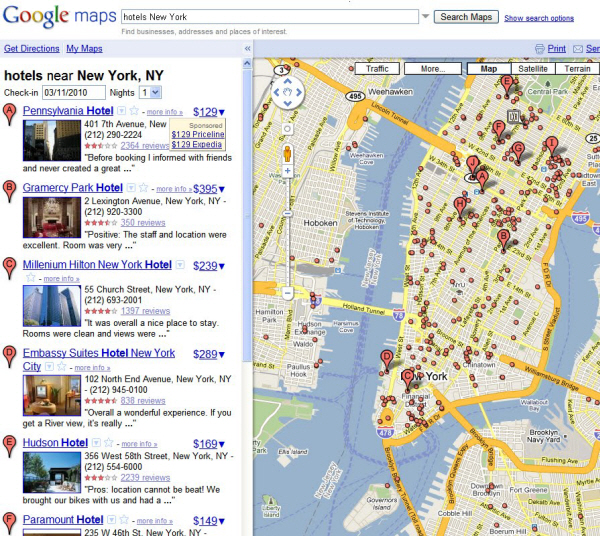I was frankly surprised and shocked that people were surprised and shocked by Google’s announcement that they are experimenting with including hotel pricing in Google Maps search results for a small. select group of users.

Google, how dare you put hotel prices on your local map listings! Now you've ruined everything!
Google’s mantra is to organize the world’s information and to simplify the user’s search experience. Price plays an important role in the hotel purchase decision and Google’s research undoubtedly indicates that people would like to know the price as soon as possible for their desired dates as they research various travel options.
Google Maps is not the endgame here, That is ultimately the search results page. One must understand that Google is merely testing the water on the Maps platform in preparation of launching the hotel price integration into the Universal Search results on all Google results pages.
Universal Search is the nifty technology that provides all those great image, video, news, map and shopping links in the Google search results page. Everyone agrees that Location Based Search and Mobile are major drivers of travel innovation – this new functionality is both geo-centric and reduces clicks /keystrokes.
Did anyone seriously expect Google to pass on this opportunity? Especially since Bing is already providing full date-driven hotel meta-search capability?
This however is not a transactional play, Google remains fully rooted in its advertising based model. They are simply enabling advertisers to link more directly and deeply to relevant content from a search results page.
One would not really be accurate in calling this meta-search either. There is not interactive comparison shopping of all hotels in the market; it is not simultaneously querying dozens of competing web sites; there are no dynamic filtering toggles. No, this is an enhancement that further aligns Google’s Adwords, Local Search, Shopping and Maps product functionality to provide a superior context-sensitive search experience.
Alignment is logical. The Google Local and Google Maps teams are an integrated team. Google Local’s Place pages already aggregate considerable content from multiple sources into a dramatically expanded hotel description. Business owners are openly encouraged to manage business details using the Google Local Business Center.
Universal Search is reportedly working well for consumer electronics, clothing, and mortgages (Google appears to currently be testing mortgage ads in the sponsored links area.) Even a search for “bottled water” returns Google Shopping results.
It seems reasonable to extend hotel search functionality given that Google already includes special features for local search (enter “Italian food 53051” into the Google search bar for mapping of Italian restaurants near Milwaukee) or trip planning (enter “ORD DFW May 3 May 5” into the Google search bar to get date sensitive deep links to seven online agency or meta-search sites.)
Here is an example of what the new hotel price link looks like in Google Maps:
For those questioning the intent to migrate this pricing capability to the Universal Search results, try this test: Enter “Los Angeles hotel” into the Google search bar. This produces an identical list of properties in the Universal Search response when compared to entering “Los Angeles hotel” in a Google Maps search. It would seem inevitable that the price link will appear in Universal Search as soon as it is thoroughly tested on the Maps platform.
For those predicting further doom and despair for the hotel industry, it is doubtful that Google will set the property results order based on the PPC bid. Google users expect relevance and putting the highest PPC bid at the top of the list conflicts with that objective. Instead, Google is looking for the link that will generate the highest clickthrough rate. As a result, Google should be primarily looking for the best rates, then the highest PPC bid on that rate to determine which sponsored link will be displayed.
Advertisers that try to bait & switch may gain clicks, but not conversion, a statistic that Google will be undoubtedly track to use as a key factor in determining the effectiveness of the link.
As Google is prioritizing the hotels returned based on what it deems most relevant, one should eventually expect to see different listings returned for different people as search progressively becomes more highly personalized.
The top seven hotels returned for Los Angeles in Google’s Universal Search (at least for me) and Maps were:
(Hotel Name – Brand Affiliation)
Hollywood Roosevelt – Thompson Hotels
Beverly Wilshire – Four Seasons
The Orlando – Summit Hotels (Preferred Hotel Group)
Hyatt Regency Century Plaza – Hyatt
Beverly Hilton – Hilton
Sunset Tower – JK Hotel Group
Westin Bonaventure – Starwood
This is a solid list, a mix of well known and unique properties – all offer good locations, albeit a bit skewed toward West Hollywood and Beverly Hills (but I bet that’s where people typically want to stay.)
My feeling is that Universal Search helps create exposure for interesting hotels running quality operations, which is a good thing. Consumers love discovering unique properties and great values. Google’s new approach appears to provide both.
The battle of the booking channel may become the most contentious aspect – especially given hotels insistence on retail pricing parity with their web sites. Will hotels get higher margins by out bidding the Online Travel Companies on a PPC basis as opposed to providing deep discounts through OTC merchant model sales? This could get interesting.
Additionally, will hotels express resistance and try to stop OTC’s from bidding on their trademarked hotel brand names as keywords? These are not technically keywords, and the OTC’s are bona-fide sellers of the hotel product. The hotels might try, but their success is unlikely.
Is Google’s addition of hotel pricing a game changer? Definitely. Is it a surprise? No. Will it hurt independent hotels? No. Will it scare a lot of people in Online Travel? Absolutely.
I can imagine the paranoid are already quoting Hunter S. Thompson’s character Dr. Gonzo from his seminal work, Fear & Loathing in Las Vegas “We know what you’re up to man.”
The more rational minds should be quoting PhoCusWright CEO Philip Wolf who appropriately themed his PhoCusWright@ITB conference, “Chaos Calls, Navigating the New.”









